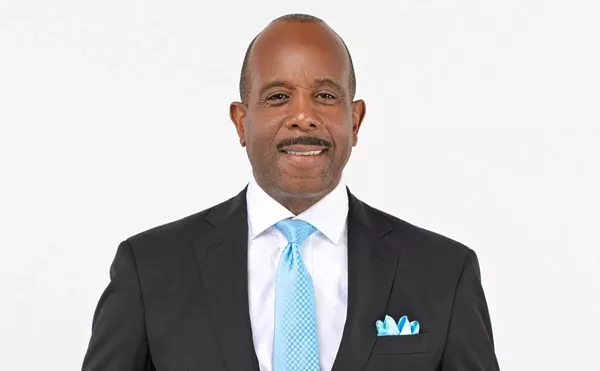
Audio By Carbonatix
[
{
"name": "GPT - Leaderboard - Inline - Content",
"component": "35519556",
"insertPoint": "5th",
"startingPoint": "3",
"requiredCountToDisplay": "3",
"maxInsertions": 100,
"adList": [
{
"adPreset": "LeaderboardInline"
}
]
}
]
Inglorious Bastards
Severin
By 1977, World War II films were out of vogue. And that year's Inglorious Bastards is simply a derivative reworking of elements from classic WWII fare such as The Great Escape and Kelly's Heroes. The film culls most from The Dirty Dozen with its mixed bag of criminals undertaking one final, redemptive mission.
There's no Lee Marvin to keep the story cooking, thus it rambles on for more than an hour as the ragtag misfits meander to Switzerland in hopes of escaping the Nazis and their fellow Americans. They slaughter a group of German soldiers who actually were Americans on an undercover mission to stop the German V2 rocket. D'oh! Rather than simply dismissing the blunder as friendly fire, the "Bastards" take on the mission themselves, swearing to stop the "damned armored train" of the film's original Italian title: Quel maledetto treno blindato.
Not all is lost. A few members of the ensemble cast stand out as the true protagonists of the film. Here, the action centers on Lt. Robert Yeager (Bo Svenson) and Pvt. Fred Canfield (Fred Williamson). Surprisingly humorous and uncharacteristically reserved, Williamson turns in a fine performance. The only African-American soldier in the group, Williamson's race keeps exposing the group to unnecessary danger as they could do a fair job of passing for German, especially with the help of Yeager, the German-speaking Minnesota redneck (you read that right).
Again, don't look for any social message here; director Enzo Castelleri — best known for his Escape from New York cop called Bronx Warriors — and the five screenwriters of this opus are far more interested in wall-to-wall mortar blasts and machine gun fire.
Recently released on DVD in this country by Severin in single and three-disc editions, giving Inglorious Bastards such a royal treatment is akin to Criterion releasing Armageddon. Oh, wait ... the extras focus mostly on Quentin Tarantino's enjoyment of the film and his impending remake. Yet, if the leaked script for Inglourious Basterds (sic) is genuine, Tarantino's version is an "in name only" remake, eliminating everything from Castellari's film except the Nazis. —Mike White
Dirty Money (Un Flic)
Lionsgate
A black car rolls into a coastal town. While waves crash on the rocky shore, three men slip out and enter a nearby bank. It's nearly closing time and the gun-toting gents are there for a withdrawal — as much as the staff can provide. Things don't go quite as well planned: One gets shot and they nab less loot than they had hoped. Thus begins Jean-Pierre Melville's stylish final film, Un Flic.
Best known for his taut tales of crime and the code of honor among thieves, Melville's career ended when the auteur died from a heart attack in 1973. Some say the biggest tragedy of Melville's demise is that his swan song film was an uneven experience that didn't live up to his usual high standards of quality. Others think that Un Flic was a fitting finale; one that can be viewed as an integral piece in Melville's partnership with actor Alain Delon (Le Samouraï and Le Cercle Rouge).
This time, Delon's on the right side of the law as Commissaire Edouard Coleman. He's pals with nightclub owner and master criminal Simon (Richard Crenna), though Coleman's far friendlier with Simon's squeeze, Cathy (Catherine Deneuve). When Coleman and Cathy are together, they're keen on "cop and suspect" bedroom games, all under Simon's knowing eye. And it's as if Cathy is merely a catalyst for an unrequited relationship between the two men, as told best via the careful framing of the characters over drinks at Simon's club.
Counterpoint to Melville's "anti-heist" film, Bob Le Flambeur, which began the director's crime film arc, Un Flic contains two robberies of significant length and complexity. Apart from the aforementioned opening scene, there's also a 20-minute scene in which Simon transfers from a helicopter to a train and back again in a set piece that inspired the finale of Brian De Palma's Mission Impossible.
Released in this country as Dirty Money, a title that robs the film of the wordplay on its original title which puns the French word for a cop ("un flic") with the colloquial term for a film ("a flick"). Removed from Melville's overall oeuvre, Un Flic is a disquietingly low-key heist film that exemplifies some of the director's favorite themes. —Mike White
WarGames: The Dead Code
MGM
Computers can do anything! If you've seen cyberthrillers like Untraceable, The Net or Antitrust, you know that for a fact.
We've come a long way from 1983's seminal computer flick WarGames where teenager David Lightman (Matthew Broderick) reached out and phreaked the system in a world of modems and rotary phones. He faced off against the U.S. government after triggering JOSHUA, a computer in charge of the country's thermonuclear arsenal. Twenty-five years has changed telephony, computing, and the nation's threat matrix.
In Stuart Gillard's direct-to-video sequel, WarGames: The Dead Code, Will Farmer (Matt Lanter) is the smoothest computer nerd audiences have ever seen. A baseball player, scholar, gamer and hacker, he's so nice that he even fixes the personal computer of his Syrian expatriate neighbor whenever the need arises. When his obnoxious buddy, Dennis (Nicolas Wright), talks Will into some petty larceny (to make money for a chess trip, natch), the pair becomes ensnared in an overly elaborate government plot to identify and eliminate terrorists with supercomputer RIPLEY.
As powerful as Skynet, the talented RIPLEY integrates with traffic lights, power grids, cell signals and all the other things that Brill (Gene Hackman) avoided in Enemy of the State. Will finds this out the hard way when he's on the run from everyone in a Hackers meets The Bourne Identity hybrid with lots of split screens and car commercial aesthetics before the film takes a sudden sharp turn. When the dust settles, Will and his gal pal Annie (Amanda Walsh) find themselves jettisoned into familiar territory, playing RIPLEY's game at a government facility.
Initially it appears that WarGames: The Dead Code may be an "in name only" sequel until Dr. Stephen Falken (Gary Reineke) and JOSHUA return. Moreover, the third act follows the blueprint of the original WarGames with only some high-tech obfuscation to update the identical finale. Between the unlikely coincidences, computer voodoo and unnecessary buzzwords is a fairly tame film that is actually more remake than sequel. —Mike White
Summer '04
Koch Lorber
Think of the worst summer vacation you ever had. Even if it went beyond National Lampoon's Vacation awfulness, it's still unlikely that it was bad as the holiday the grumpy 15-year-old boy in Summer '04 had. Not only does he have to deal with the realization that his 13-year-old girlfriend is kind of a slut, but also that the older man she falls for ends up shtupping the boy's mom. Yeah, that's pretty bad, right? This German film dives gleefully into its mission of discomforting morality-smashing, summed up beautifully when Dad mutters, "Who are we to judge?" The creepy, sexualized teenagers are only the beginning of the spine-chilling weirdness at play here, as director Stefan Krohmer plunges mom Miriam (played to disaffected perfection by Martina Gedeck) into a traumatic bit of adultery that has her ping-ponging between maternal responsibility, wifely devotion and Teutonically hot sex. Krohmer — just like his near-namesake Eric Rohmer — has produced a morality play with decidedly vague morals. The director infuses all of Miriam's relationships with a sublime balance of sweetness, romance and loyalty, so the viewer winds up as torn as she is when it comes to deciding exactly what the right thing to do is. While the tension builds up within the family unit, poor 15-year-old Nils' vacation just keeps getting worse and worse, but hey, who are we to judge? —Jason Ferguson





